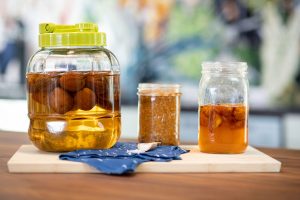Can probiotics and prebiotics go viral?

By Prof. Glenn Gibson, Food Microbial Sciences Unit, Department of Food and Nutritional Sciences, The University of Reading, UK
I usually think that psychics are pretty funny and are to be avoided, but what about this from Sylvia Browne published in 2008? “In around 2020 a severe pneumonia-like illness will spread throughout the globe, attacking the lungs and the bronchial tubes and resisting all known treatments.”
Let’s hope the latter few words of this prophesy are badly wrong but, eerily, we are now living through this prediction made 12 years ago. The coronavirus (COVID-19) pandemic has dramatically changed the world in a few weeks, how we are currently behaving and how we will behave in future. I am typing this in my office at the university and have seen just one other person all morning. Who thought you could self-isolate by coming to work? It is a bit like living in a science fiction film, but this is real and very serious. Everyone is worried about themselves, family, friends, food, way of life, travel, entertainment, jobs, finance, property, ability to exercise, the more vulnerable members of society and other major challenges (not to mention toilet rolls, hand gels, soap). If we think humans run the world – then microbes may well have their own valid claim on that!
What can we do? Wait for a vaccine — science is progressing remarkably quickly on that front and it is brilliant to see. But what for now? How may we help flatten the infection curve?
I’ve always thought that the way you deal with harmful microorganisms is to attack them with other microbes, the simplest form of germ warfare (either their direct antagonism, non-specific immune effects or metabolic products). I’ve also thought that the below work from Kiel in Germany is among the most impressive studies I have seen on probiotics:
Other similar research then followed. In 2015, the Cochrane group looked at the totality of such evidence available for all probiotics (Probiotics for preventing acute upper respiratory tract infections). They concluded “Probiotics were found to be better than placebo in reducing the number of participants experiencing episodes of acute URTI by about 47% and the duration of an episode of acute URTI by about 1.89 days.”
These studies convinced me that gut bacteria could mediate activities outside of their normal habitat – amazing! The German study showing a quantifiably speedier recovery from flu (almost 2 days quicker on average) and fewer symptoms (ca. 20% less), in a placebo-controlled trial involving a large number of volunteers, opened up new views for me on what probiotics could do. I must admit that I have been recommending the product to everyone I know since the COVID-19 outbreak started. By the way, if the manufacturers see this blog and you have experienced sales increasing in the Reading area or North East England (where I am from) then I am unashamedly taking the credit!! I have also been recommending a prebiotic for improved gut health, but this is no surprise since it is a product my research group first developed in 2000 and worked upon in human intervention studies until 2017.
The plot thickened yesterday, when I was made aware of this article published a few weeks ago:
2019 Novel coronavirus infection and gastrointestinal tract
For the last couple of years, I have been lucky to have worked with one of the world’s leading campaigners Alan Barnard (more later). His summary on the above paper has been sent to the UK Government, other MPs and Lords and is as follows:
In the article, the authors say:
- They have found, “the presence of viral nucleic acids in the faecal samples and anal swabs of patients with COVID-19.”
- And states, “Numerous studies have shown that modulating gut microbiota can reduce enteritis and ventilator-associated pneumonia, and it can reverse certain side effects of antibiotics to avoid early influenza virus replication in lung epithelia.”
- It suggests that, “Therefore, we speculate that COVID-19 may, to some extent, be related to the gut microbiota.” This is a similar activity to the SARS virus.
- And says, “The Chinese government and first-line medical staffs accept the importance of the role of gut microbiota in COVID-19 infection.”
- And concludes, “We speculate that probiotics may modulate the gut microbiota to alter the gastrointestinal symptoms favourably and may also protect the respiratory system.”
A representative of the Government has acknowledged that they are now aware of the research. I feel this is great news in having this at least on their radar screen and that the UK may consider it as part of the mixture of responses.
As we would expect, Gregor Reid is right on the case and published an excellent opinion piece yesterday: Can bacteria help humans fight COVID-19?
Gregor says, “there is a scientific basis for probiotics helping the respiratory tract against colds and flu, and right now we’re short on therapies for COVID-19. We’re only asking for people to consider this and maybe someone to instigate a quick study. If they can get a vaccine into testing by now in the US, someone should test a probiotic versus placebo.”
Then, there is this today: Coronavirus: Australian scientists map how immune system fights virus summarising research published in Nature Medicine, that showed people are recovering from the new virus like they would from the flu. “This is important because it is the first time where we are really understanding how our immune system fights novel coronavirus,” said co-author Prof Katherine Kedzierska. She also said, “It is really key now to understand what is lacking or different in patients who have died or who have really severe disease – so we can understand how to protect them.” Well, we know that indigenous gut bifidobacteria (strains of which are used as probiotics) do decrease with age and this possibly contributes to so-called “immunosenescence” with concomitant higher risk of acquiring, and dealing with, infections. Hence, great interest in probiotic and prebiotic use for the older adults in our societies, ever since the Crownalife EU funded research which ended in 2004 (by the way, my views on the effect of Brexit to UK science and society generally are not publishable…). But guess what? – two probiotic strains used in the German cold and flu trials cited above were bifidobacteria.
I know some cleverer people than I will rubbish all of this but, in my humbly subjective view, there are too many jigsaw pieces to ignore here and I will keep on recommending the probiotic and prebiotic products.
Back to Alan, here is his new effective and striking message on COVID-19, now rolled out all over the UK:
ISAPP is delighted to work with Alan, and he attended our Antwerp conference in 2019. Together we helped set up an All Party Parliamentary Group (APPG) on the microbiome chaired by the esteemed Julie Elliot MP (whom we approached because of her boundless energy but also because she is a Sunderland AFC fan – the unequivocal professional and personal seal of approval). As part of the APPG activities, we were very pleased to welcome Lords Taylor (of Holbeach) and Haworth (of Fisherfield) to our gut model laboratories in Reading 2 weeks ago. Both their Lordships were very positive about probiotics and prebiotics, promising to help propel the messages.
A further peer, Lord Stone of Blackheath, even went as far as mentioning ISAPP in a House of Lords debate on wellbeing held on March 12th. At the end of his speech, Lord Stone said:
“Finally, we are what we eat. Trillions of bacteria live in our guts. We know that these can be altered by diet to promote well-being. Again, there are thousands of published research studies showing how prebiotic and probiotic interventions can have positive effects on our well-being. They address coughs and colds, eczema, inflammatory bowel disease, bowel cancer, obesity and even mental illness. The International Scientific Association for Probiotics and Prebiotics brings together leading scientists in gut microbial research to enhance understanding in this area. As such, there are many useful resources available on its website. That would be another route to national well-being that the Minister might have the department examine, thereby increasing well-being and saving money and resources in the long term.”
Do these views apply to the COVID-19 outbreak, the world’s most serious and unprecedented issue of modern times? Obviously, there is no evidence that probiotics or prebiotics directly influence COVID-19 and we may never know if they will, but a quick benefit-to-risk thought makes recommendation of some a “no brainer” for me.






